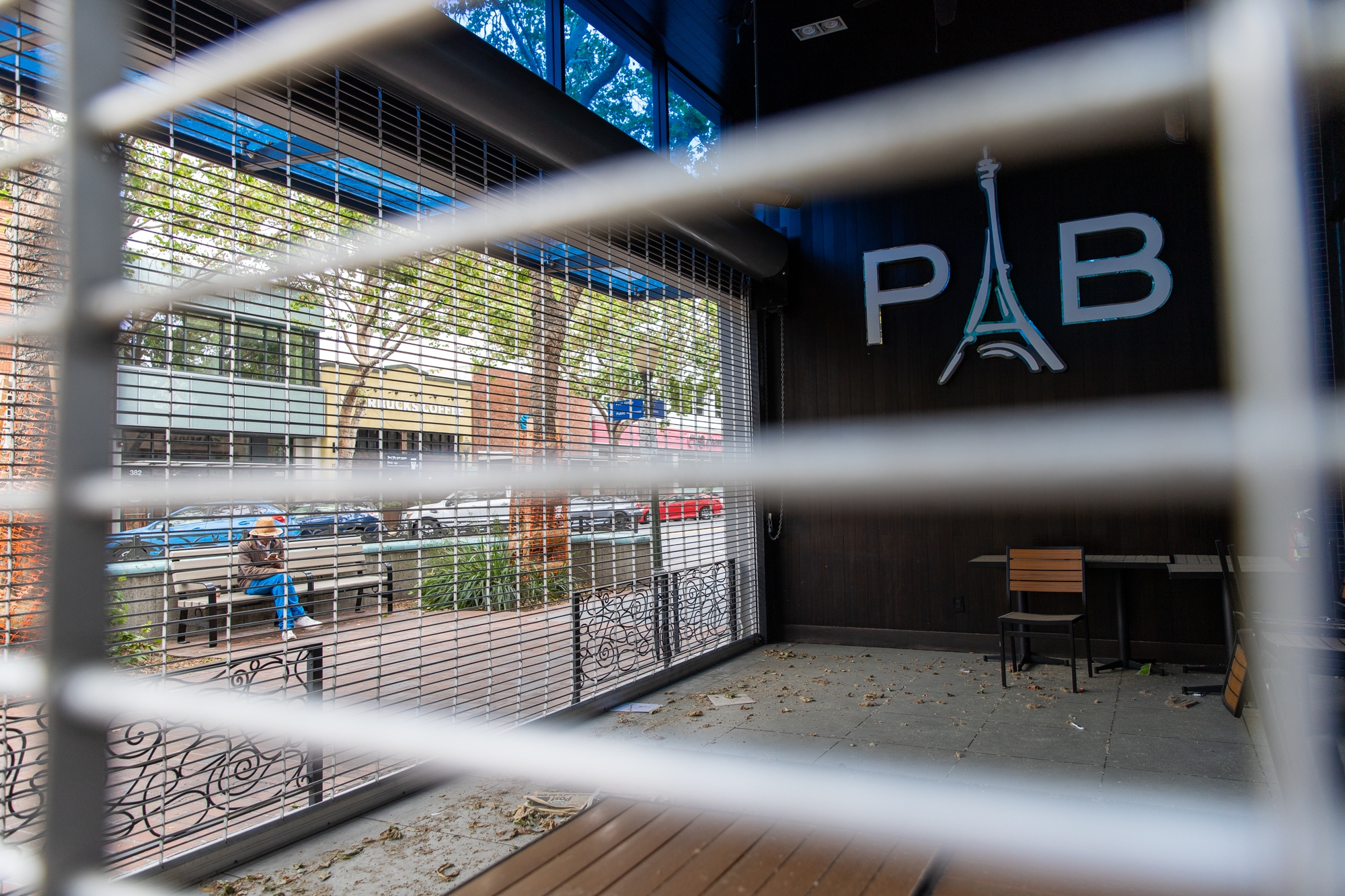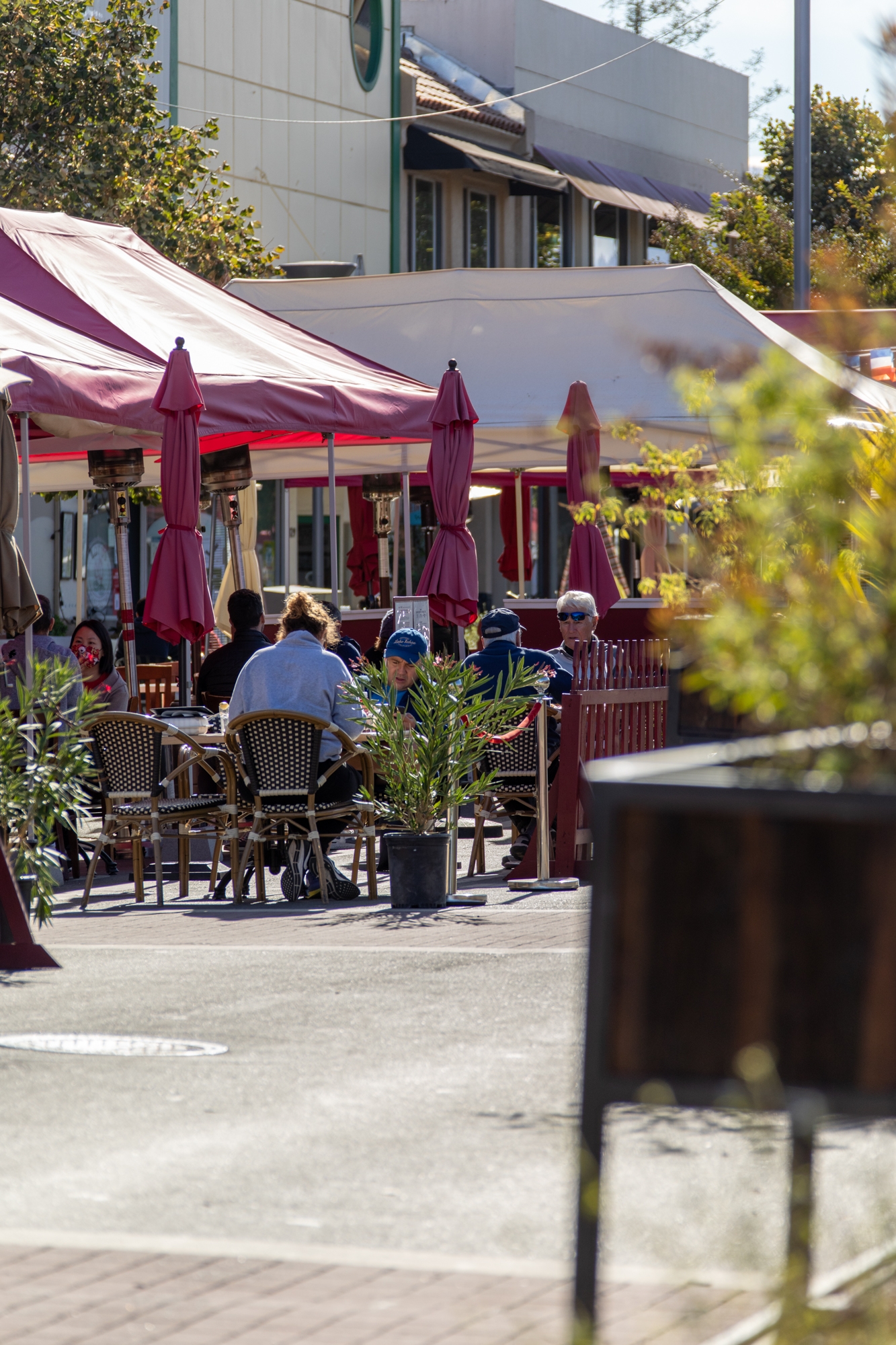Confronted with a struggling retail climate, the Palo Alto City Council voted Monday to adjust some of its retail rules and allow gyms and small medical offices to fill vacant space in the city's main commercial areas.
At the same time, council members stopped well short of the type of changes they had considered last November and, in a reversal, concluded that these new uses should not be allowed at vacant properties on University and California avenues but rather limited to other streets in these main shopping areas. In addition, the council agreed to adjust some of its retail definitions to better differentiate between full-service restaurants and businesses like ice cream shops and sandwich shops — a key distinction when determining parking requirements.
The moves follow up and — in some ways — retreat from the action that the council took last November, when it responded to growing retail vacancies in the city's shopping areas by unanimously approving code changes that would give more leeway to certain types of businesses. This included allowing new barbershops and beauty salons on California Avenue and letting medical offices that are smaller in size than 5,000 square feet set up shop without a conditional use permit.
Those changes were never codified, however, because the council never approved them on a formal "second reading." Instead, the council decided to reconsider the issue after several members, including those who were elected last November, expressed concerns about the new rules.
Vice Mayor Pat Burt reiterated these concerns on Monday night, when he suggested that the businesses facing the main streets — California Avenue and University Avenue — should be "true retail" rather than medical clinics, yoga studios or personal gyms.
"They are not really adding to the retail environment where we want to attract a critical mass of retail — drop-in retail and things like that," Burt said.
By a 5-2 vote, with council members Alison Cormack and Greg Tanaka dissenting, the council approved Burt's proposal that eliminates some of the main provisions from the November ordinance. Specifically, it bans the city from allowing new nail salons and beauty shops on California Avenue, though these functions would be allowed on other streets in the commercial district. It also prohibits new gyms on University and California avenues.
The November proposal would have permitted medical services that are 5,000 square feet or smaller to open in downtown and California Avenue without a conditional use permit. The Monday revision, by contrast, prohibits expansion of medical uses on University and California avenues, as well as at Midtown and other neighborhood shopping centers. It does, however, leave the door open for these uses on other commercial streets.
While the changes to retail rules are designed to respond to a troubling vacancy trend over the course of the pandemic, staff and some council members acknowledged that the Monday revisions are unlikely to have a dramatic effect. Planning Director Jonathan Lait said he does not believe the ordinance will, in of itself, "make huge waves one way or the other."
"I think it works at the margins to address some of the retail food service uses that we had," Lait said Monday. "It opens the door to some medical uses and, hopefully, some retail-oriented medical uses. It's liberalizing our definition to some degree but there's more work that we need to do."
The council directed its Planning and Transportation Commission to take up the broader questions about retail use and the best ways to differentiate between food establishments. While the city has proposed that businesses that have a "full service kitchens" be treated differently from smaller establishments like ice cream shops, one major property owner has suggested that this could cause confusion for new tenants. Dean Rubinson, director of development of Ellis Partners, which owns Town & Country Village, asked the city not to use kitchen equipment as a factor in evaluating details like parking requirements. Rather, the city should base its definitions based on the type of services an establishment provides, such as takeout or space to eat onsite.
"In our experience, there are many quick-serve food venues that have all the components of a Full Commercial Kitchen, but sell the food in a counter-service, ready-to-eat format that would not justify the same parking ratios as a full service, sit-down restaurant," Rubinson wrote in a letter to the council.
Cormack and Tanaka both argued that the changes don't go far enough. Cormack noted the general trend away from traditional retail and toward personal services. She also said she has no interest in making gyms and nail salons less visible by prohibiting them on the city's main shopping strips.
"I understand the uses will then be permitted for some period of time, but we do have some significant vacancies and I think to the extent that people are shifting from buying things to buying services, I think it would be wise to go along with that," Cormack said. "I don't think preventing places and services that people want to use will be particularly helpful."
Tanaka agreed and suggested that some of these businesses create the foot traffic that the restaurants and retailers need to survive. He proposed moving more aggressively on relaxing restrictions for retail uses.
"I think it's important that we act swiftly, because if we don't, there may not be much of a downtown to go back to when things actually start to open up," Tanaka said.
Council member Greer Stone said it's important to make sure commercial districts and neighborhood shopping areas such as the Midtown Shopping Center retain retail and restaurant uses that serve the surrounding neighborhoods. Allowing uses that could push these businesses out will require Palo Alto residents to drive elsewhere for food and shopping. Like most of his colleagues, he favored the cautious approach.
"Too often, when we're trying to make short-term fixes — we end up doing that to the detriment of long-term planning that we want," Stone said.
Find comprehensive coverage on the Midpeninsula's response to the new coronavirus by Palo Alto Online, the Mountain View Voice and the Almanac here.




Comments
Registered user
Another Palo Alto neighborhood
on Mar 10, 2021 at 9:24 am
Registered user
on Mar 10, 2021 at 9:24 am
Useful retail is being lost which is causing more shopping to be done online, which is the cause of losing even more useful retail. Obviously the lockdown is adding to the problem.
But the pandemic will end and we will hopefully be able to work in our offices and meet a friend for icecream or buy a sandwich for lunch while running errands soon. Anything that generates foot traffic will add potential customers to any retail located next door or nearby. A gym could be a draw for opening a juice bar, a medical office could be a draw for a pharmacy. An empty store front is likely to promote nothing.
Registered user
Another Palo Alto neighborhood
on Mar 10, 2021 at 11:19 am
Registered user
on Mar 10, 2021 at 11:19 am
Things I hate buying online:
Art
Books (because I appreciate a local bookstore with staff who knows what I like and watches for books for me. Thanks, Books Inc. and Drew!
Furniture (colors, scale, and quality are always unclear online)
Clothing (same problem plus fabric textures and patterns and garment fit)
Fresh food
Shoes (They have to fit perfectly.--Color and quality a problem again)
Household linens: bedding, towels...anything that requires careful color, touch selection
Garden plants (bc you can't see if they are root bound or diseased. Quality matters.)
Hardware--bc often when you need to fix something, your need is urgent. A delivery wait is a big problem when you faucet is gushing and paying higher shipping fees inflates the cost of parts.
Paint (Again, it is impossible to see subtle differences in color online)
Optical stores--bc glasses need to be tried on for fit and appearance.
And pretty much everything else, bc I find online shopping to be a dull chore compared to quality retail shopping. Online is for low cost stuff where quality, color, fit doesn't matter.
I miss local stores with variety and knowledgeable service workers. I'll choose a clothing store with nice selection, and a fitting room over online any day.
And, BTW, tech companies, your unwillingness to TALK with your customers is dismissive. Post a useful phone number with access to helpful, well-trained humans for when your online "customer service" robot process utterly fails, as it often does.
Registered user
Fairmeadow
on Mar 10, 2021 at 2:33 pm
Registered user
on Mar 10, 2021 at 2:33 pm
I am glad that I am not a landlord of commercial properties in Palo Alto. It must be a nightmare to deal with the city council which seems to excel at micromanaging.
And what exactly is wrong with medical offices or gyms or beauty salons on the main shopping streets? I use an optometrist on California Avenue. Whenever I go there, I eat at a restaurant on the street afterwards. Otherwise I scarcely go to California Avenue, as I am not in the habit of going to restaurants regularly. It seems to me quite plausible that different types of businesses can form symbiotic relations and attract customers because of each other's presence. The city council should let the businesses themselves decide what makes most sense to operate in a commercial area.
Registered user
Embarcadero Oaks/Leland
on Mar 11, 2021 at 8:13 am
Registered user
on Mar 11, 2021 at 8:13 am
For starters, medical and dental offices don't pay sales tax and this was a rushed job without even giving the poor struggling retailers a chance to recover. But undoubtedly the landlords would still get their commission on sales/fees,
In good times, Ellis of Town & Country never gave his tenants a break, even those family businesses who'd been there for decades and wanted to move BACK to their smaller empty store from the bigger store to which he'd upsold them during the dot.bomb crash of 2000.
Registered user
Another Palo Alto neighborhood
on Mar 11, 2021 at 8:18 am
Registered user
on Mar 11, 2021 at 8:18 am
Another consideration...use the vacancies to house the homeless.
Registered user
Mayfield
on Mar 11, 2021 at 2:53 pm
Registered user
on Mar 11, 2021 at 2:53 pm
This pandemic will end and we will be hungry for our bakeries, our clothing stores, our gift shops and other stores. We shouldn't let medical offices, nail salons and gyms(!) take over our modest downtown areas. Keep the longtime nature of University Avenue, Cal Ave, T&C and Midtown as they have been until this pandemic forced closures as residents sheltered at home and bought online. Life will normalize. Don't kill our wonderfully modest shopping areas because the real estate owners are howling. We've all lost something during these crazy times. Time to get over it.